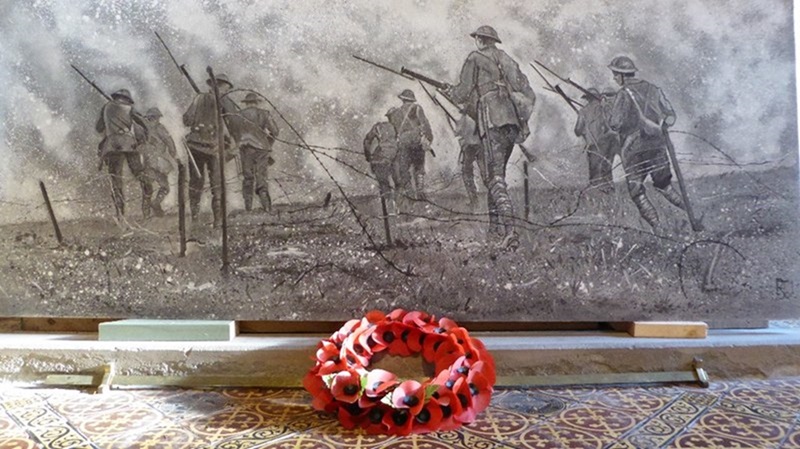.
Returning Soldiers
With hedgerows, fields and trees
the soldiers of a forward trench
have rested with unease,
reduced beyond a carcase stench.
Beneath a one-time, war-torn land
they’ve lain—forgotten bones.
A century plus has spanned
since Frankish earth expunged their groans,
flung up, with shrapnel fed,
that nowadays rears crops of wheat,
while blanketing their bed
with summer gold from skull to feet.
When these lost men were found
(these Tommies who no more could feel)
and unto sacred soil were bound,
a closure did their slumber seal.
.
.
Paul A. Freeman is the author of Rumours of Ophir, a crime novel which was taught in Zimbabwean high schools and has been translated into German. In addition to having two novels, a children’s book and an 18,000-word narrative poem (Robin Hood and Friar Tuck: Zombie Killers!) commercially published, Paul is the author of hundreds of published short stories, poems and articles.















Known but to God, and never forgotten. Thank you, Paul, for a touching Wordsworthian closure remembering this group I had not heard of. An American known to be such by uniform buttons and trench knife was buried in one of our French cemeteries a few months ago. Discoveries like these always recall the honor due each sacrificed life, and enable us to pay a bit in fact and feeling.
Thanks for reading and commenting, Margaret, and for recognising the Wordsworthian ending, fashioned from a heartbreaking poem that always gives me goosebumps.
I don’t recall that particular occasion of the American soldier being found and recognised as such by bits of uniform and equipment, but wrote this poem after three British soldiers were recently found in what’s now an agricultural field. DNA results on two of the three remains meant relatives were able to be present for their re-burial in a French war cemetery.
Not too long ago, the remains of Rudyard Kipling’s son John were found and identified in a French battlefield. DNA is what clinched the ID. Almost every soldier who is listed as “Missing In Action” is most likely a soldier whose remains are yet to be discovered.
There’s so much to this poem, Paul. that is moving and resonates with historical echoes and stark images of death. The Great War should have been the last war. And yet the killing goes on and on. I’m particularly haunted by your words “with shrapnel fed.” A most moving poem.
Thanks, Brian.
It’s just a shame we’re so poor as a species at preempting and preventing conflict, or adapting away from violence to solve problems. But who knows, with time we’ll hopefully learn.
I’m not sure how many ‘Tommies’ and other WWI soldiers are still out there, buried in the earth of Flanders. One estimate I found said half a million – mind-boggling.
This is very moving and beautiful, Paul, perhaps right up there with one of my favorite poems, “In Flanders Fields”. So many of your lines stand out as so well-expressed that they really awaken the senses: “reduced beyond a carcase stench”; “since Frankish earth expunged their groans, / flung up, with shrapnel fed, / that nowadays yields crops of wheat.” Thank you for honoring veterans on this important day.
Thanks for your comment, Cynthia. It means a lot.
In Flanders Fields is one of my favourites, too. I used it as a model to learn how to write rondeaux.
I recall my mother being saddened, many years back, when there were no longer enough able-bodied WWI veterans for a march by at the Cenotaph on Remembrance Day. It brought home to me, young though I was, the importance of remembering, and am deeply glad and humbled you feel I’ve done a good job.
There is a beautiful resonance to your poem and like Cynthia, it reminded me of the great poem, “In Flanders Fields,” by John McCrae. British Armistice Day diverges from our Veterans Day in that we Americans honor the dead military on Memorial Day and all veterans who served on Veterans Day. Here is a quote from the Memorial Day Foundation: “Memorial Day and Veterans Day honor the sacrifices of innumerable individuals who sacrificed themselves to preserve the freedoms all Americans enjoy, with Memorial Day remembering those who gave their lives, and Veterans Day honoring all who served in the U.S. Armed Forces. Thank you for your thoughtful poem on such an auspicious occasion.
Thanks for reading and for your positive comment, Roy.
This is an occasion that still has true meaning, I feel, and needs to be marked.
Teshuva…
There’s something that’s just right about honoring and returning the remains of the dead to memory and to their homes. I particularly like the meta-level, pointed out by Dr. Coats. You brought back a Wordsworth line in the way the remains are brought back. Sweet.
Thanks for your comment, Daniel.
As a kid I watched a really spooky film on this sort of topic of ‘lost’ soldiers, a real heart-wrencher called ‘Sole Survivor’, made in 1970. It’s well worth a watch and is very poignant.
A box of tissues is required to watch the film.
Thanks for this wonderful addition to our Veterans Day thoughts. The news of reburial of lost soldiers, returned to their native soil, touches the hearts of everyone. In that instant, we feel a flash of the enormity of what they did, on behalf of their family, all of us, at least for that moment.
Thanks for reading, Hari. Your comment says it all.